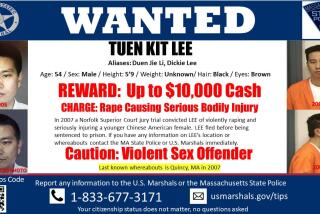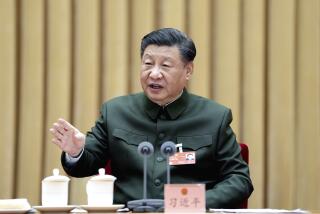Judge’s Reasons for Issuing Release of Scientist Disclosed
- Share via
ALBUQUERQUE, N.M. — The judge who tried to release fired nuclear scientist Wen Ho Lee from jail on $1-million bail said the government failed to present convincing arguments for keeping him behind bars until he is tried.
Wen Ho Lee was to have been released Friday from the Santa Fe County jail, where he has been kept since December in solitary confinement. But an appeals court halted his release at the last minute while it considered an appeal from the government.
U.S. District Judge James Parker, in an unsealed opinion released late Friday, for the first time outlined his reasons for wanting Lee released, saying he was no longer convinced that Lee had downloaded some of the country’s most sensitive nuclear secrets.
“What the government described in December 1999 as the ‘crown jewels’ of the United States nuclear weapons program no longer is so clearly deserving of that label,” he wrote.
The 60-year-old Taiwan-born scientist, a naturalized U.S. citizen, allegedly downloaded restricted data about nuclear weapons to unsecured computers and tapes at Los Alamos National Laboratory in New Mexico.
He has been jailed nine months awaiting trial, scheduled for Nov. 6. If convicted of all 59 counts, Lee could face life in prison. Supporters say Lee is being singled out because of his race, which prosecutors deny.
Parker refused in December to set bail, citing “clear and convincing evidence” that Lee was a threat to national security.
But after hearing conflicting views over the importance of the information Lee is accused of mishandling, the judge wrote in his initial order for release Aug. 24 that the government “no longer has the requisite clarity and persuasive character necessary” to keep Lee jailed pending his trial.
Parker, who set strict conditions on Lee’s release, including electronic monitoring and a phone tap, was critical of the court’s decision.
In the unsealed order Friday, Parker was even more critical of the prosecution, saying it “has failed, at this time, to meet its burden.”
Parker said he remains “seriously concerned” about some of Lee’s actions, such as failing to tell Los Alamos officials that senior Chinese weapon scientists prodded him for classified information during what the judge called “an extremely unusual secret meeting” in Lee’s Beijing hotel room in 1988.
The judge, however, also pointed to testimony from an FBI agent who acknowledged that several pieces of key testimony he gave during Lee’s first bail hearing were incorrect.
Parker also said the conditions he required for Lee’s release, which would strictly limit Lee’s movements, were enough to prevent the scientist from passing on several of the computer tapes the government says are missing.
More to Read
Sign up for Essential California
The most important California stories and recommendations in your inbox every morning.
You may occasionally receive promotional content from the Los Angeles Times.













